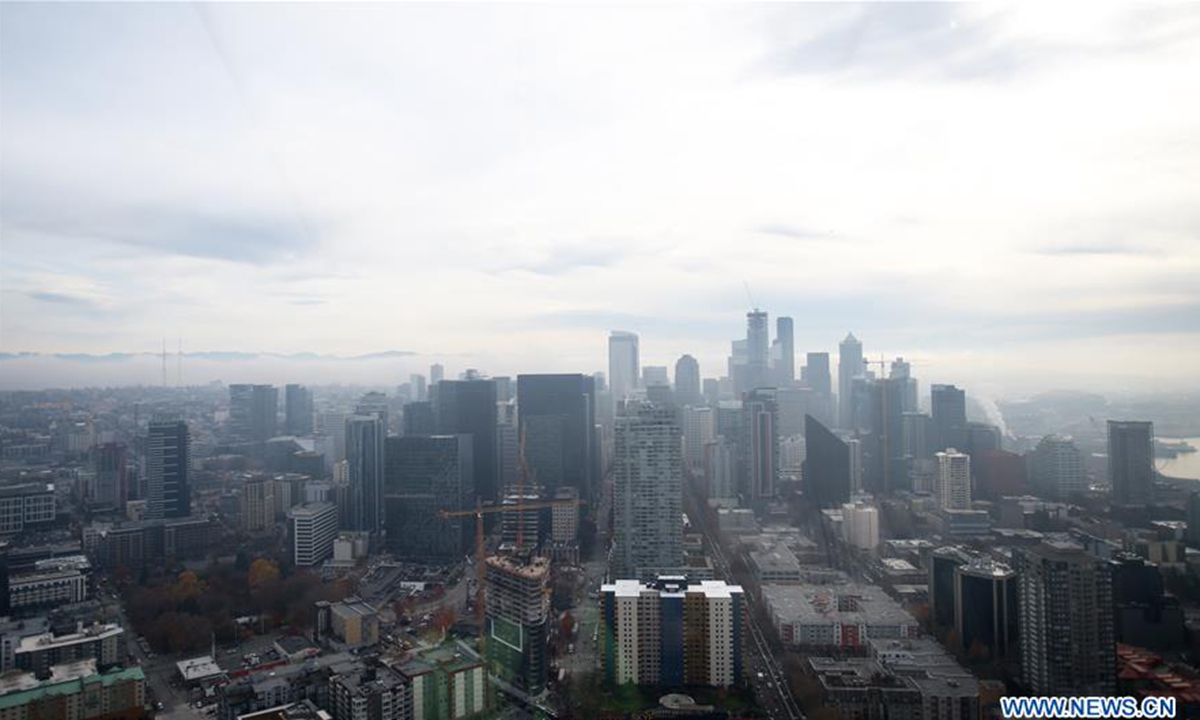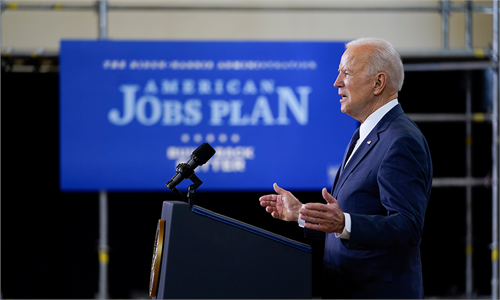Can US fix joblessness in post-pandemic era?

Photo taken on Nov. 14, 2019 from the Space Needle shows the downtown Seattle, Washington, the United States. Seattle is a seaport city on the west coast of the United States. The city is known for art and music, and is home to a number of technology companies. Photo: Xinhua
I recently participated in an online discussion in Beijing, and one of the topics was economic recovery after the COVID-19 pandemic. Some experts said that new technologies, such as artificial intelligence, will quickly lead the economic recovery at a different speed from the past. The rise of the Nasdaq Composite Index seems to have confirmed this judgment.During the discussion, I kept thinking about my trip to Seattle, the US three years ago.
The plane took off at 11:20 pm that day. A young Chinese couple were sitting before me. During our conversation, I learnt that the woman was pregnant and she was going to Seattle to give birth to the baby. For many Chinese families, the US is still a country full of opportunities. Choosing an American identity is equivalent to give their children better opportunities for future development.
But 20 hours later, when I was standing in downtown Seattle, I saw another scene that made me a little upset.
At almost every intersection, there was a beggar. Technically, they were not beggars, but the unemployed. All of them were young and some had children with them. One of the unemployed had two children who were sitting in strollers, wearing children's clothing, which was not beautiful, but new at least.
There was one person with a sign next to him, which read he was a father of three who had a PART TIME job but didn't have enough money to feed his kids.
This scene is different from what I had seen on the streets of New York a decade ago. Most of the homeless I met there were people of color or alcoholics. They often slept in the heat of the subway vents during cold days. This time, the unemployed people I saw in Seattle's streets were almost exclusively middle-aged white men.
On the other hand, large companies continue to dominate Seattle's business landscape. They are the global leaders in high tech and web technologies, Amazon, Microsoft, Boeing, etc. These companies still have a large talent gap and are continuing to shift jobs away by working remotely to fill that gap. The profitability levels of these companies are rising as a result.
It's easy to feel that there is a social storm brewing under the surface as rapid social and economic development led by new technology takes hold.
Employment opportunities have always impacted how Americans see China. When they lose their jobs, their attitude toward Chinese manufacturing and the shift of big companies to China will change fundamentally.
Certainly, what's most important is that their despair toward the future will lead them to extremes. To ordinary people in the US, no jobs or opportunities means no future. It's impossible for all of them to seek employment in high-tech companies, like Amazon, Microsoft and Boeing Commercial Airplanes. Even in these companies, structures of employees and investment have been changing, and they do not need to hire large number of staff.
In the post-pandemic era, the biggest challenge that the US will encounter is to create more jobs for the unemployed; otherwise this country will continue to pay the huge relief bill for them.
How to solve the problem of increasing unemployment in the process of high-tech development is a dilemma.
Carl Benedikt Frey, a British scholar, mentioned in his Financial Times article entitled "Covid-19 will only increase automation anxiety" that, "most jobs likely to be automated are of lower pay. In 2016, based on our research, then-president Barack Obama's Council of Economic Advisers estimated that 83 percent of workers in occupations that paid less than $20 an hour were at high risk of being replaced, while the corresponding figure for workers in occupations that paid more than $40 an hour was only 4 percent."
This trend will not change because of the pandemic, but it will only accelerate in the years to come. Through various forms, wealth has shifted further to the high end and the rich. And the power of automation and digital technology, represented by Amazon, are intensifying social divisions and could be a source of social instability for a long time to come.
What the US faces is not only an American problem, but a global one. However, as the US has a stronger and more powerful technology investment and monopoly advantage, with Wall Street inclining to these enterprises, the investment in other industries has been greatly reduced. As a result, job opportunities in the US are constantly squeezed out. High-tech industries have developed, but will ultimately lead to social fracture.
Fixing this structural problem is the key to make America great again.
The author is a senior editor with People's Daily, and currently a senior fellow with the Chongyang Institute for Financial Studies at Renmin University of China. dinggang@globaltimes.com.cn. Follow him on Twitter @dinggangchina



